
Simple Past or Past Perfect? - An Inductive Approach
Another one on the verb tenses series (the 6th, I believe), this time comparing Simple past and Past Perfect. 2 PAGES. KEY INCLUDED. Students read some sentences and complete the tables with the correct verb forms. After inferring the rules of the use by matching the sentences at the top with the right meaning, they do 3 exercises with an increasin...
Level: intermediate
Age: 12-17
Type: worksheet

THIS or THAT ? + animals
Sts look at the pictures and complete with THIS or THAT. Hope you find it useful! Fabiola HAPPY EASTER! :O)
Level: elementary
Age: 6-12
Type: worksheet

Brtitish and American English
This worksheet deals with words that are different in British and American English.
Level: intermediate
Age: 12-17
Type: worksheet

A / AN & SOME / ANY
Students will read and learn about the use of "A / A & SOME / ANY" and then they will do some exercises. Hope you also find it useful and amuzing. ENJOY;)
Level: elementary
Age: 12-17
Type: worksheet

LINKING WORDS -1 (both....and/not only.....but also/either......or/ neither.....nor) (2PAGES)
explanations of both...and, not only....but also, either....or, neither....nor. 2 PAGES and 6 exercises. Hope to be useful... have a nice day :)
Level: elementary
Age: 8-17
Type: worksheet

Past Simple or Present Perfect(+Key)
The first task consists in putting the bracketed verbs in the correct tense and then match each picture with a sentence. Second, pupils have to complete the letter with the correct tense for the given infinitive verbs.(+ Key)
Level: intermediate
Age: 9-14
Type: worksheet

Should or Shouldn�t (What students should or shouldn�t do at school)
This worksheet is about the use of should or shouldn�t. Students have to look at the picture and decide whether to use should or shouldn�t with the correct verb from the list. Answer key is included. I hope you like it.
Level: intermediate
Age: 9-17
Type: worksheet

gap filling
here are the mixed gap filling exercises including the tenses above. please make sure that your students have grasped the subjects before studying in order to avoid any confusion.
BE GOING TO, WILL, SIMPLE PAST, PRESENT CONTINUOUS OR PAST CONTINUOUS
Level: intermediate
Age: 12-17
Type: worksheet

Some, any & no - Guide with exercises (keys included)
2 pages full of exercises to practice. Grammar guide with: some (affirmative, interrogative - requests and offers); any (interrogative, negative, affirmative); no. Keys included. Prepared for pre-intermediate students, hope it�s useful!
Level: intermediate
Age: 13-17
Type: worksheet

William Shakespeare - fun facts (plus key)
Fun sheet with fun facts about Shakespeare. Students read the info and guess the solutions to the missing parts. Key included (it can serve as a poster, too). Key to his works is here: http://shakespeare.m it.edu/
Have fun!
Level: intermediate
Age: 14-17
Type: worksheet

CONJUNCTIONS -And, But, Or, Because, After, Before, So & If + KEY
The Worksheet is to practice the use of these common linkers. There is a brief grammar explanation followed by an exercise in which students have to fill the blanks with the right conjunctions. I have included the keys on the second page. Hope it will useful ^_^
Level: elementary
Age: 8-12
Type: worksheet

American English and British English
Some exercises about the differences between American and British English.
Level: elementary
Age: 11-14
Type: worksheet

Present Perfect Simple or Continuous
Brief notes and three exercises, two to compare and use the present perfect tenses and one to choose between the Present Perfect and the Simple Past - two pages in all.
I hope you will find it useful.
In the preview, the notes appear almost unreadable, but in reality they are okay.
Have a nice day :)
Level: intermediate
Age: 10-17
Type: worksheet

Simple present or Present Continuous? - Speaking + Writing very short exchanges
Students follow the model: They ask questions and answer (using the simple Present and the Present Continuous) according to the notes. Then, in the second exercise they cross the wrong tense out and, finally, they complete the sentences with the right verb tense. Have a good Thursday! Mena:)))))
Level: intermediate
Age: 11-17
Type: worksheet

AT THE STREET (b&w+key included)
1) Students look at the picture and match the words. 2) They fill in the blanks with "there is-there are- there isn�t-there aren�t- a-an-some-any". 3)They look at the picture and fill in the blanks by using the words given in Activity-A. 4)They decide True or False. 5) They do the wordsearch. Hope it helps. Have a great week :)
Level: elementary
Age: 10-17
Type: worksheet
|

Summer Holidays (Flashcards or Presentations) - 2nd Set
Hi, there everybody! This is my first PPT contribution. As I wanted some flashcards related to "Summer Holidays" and as it was too big to share here by Word, I decided to make a PPT presentation, which you can show in your classes, if it is possible in your school, or print it to use as flashcards, as it is my case. It includes sea animals, sports ...
Level: elementary
Age: 3-17
Format: PowerPoint

THEIR, THERE OR THEY�RE - GAME (2)
HOPE YOU LIKE IT.
Level: elementary
Age: 10-14
Format: PowerPoint

ADJECTIVES ED OR ING
This is my ppt version of adjectives ending either wirh ED or ING. Rules are explained, examples are given and the opportunity to practice as well. HAVE FUN!!!!
Level: intermediate
Age: 9-17
Format: PowerPoint

violence or bullying
it�s a project dealing with violence at school (causes, effects and solutions)
Level: intermediate
Age: 12-17
Format: PowerPoint

ACTIVE OR PASSIVE - present perfect
Students have to put the verbs in brackets into either the active or passive form of the present perfect. Jannabanna
Level: intermediate
Age: 14-17
Format: PowerPoint

ACTIVE OR PASSIVE
Students have to decide whether to put the verbs into the passive or active forms. They must also use the correct tense !!
Level: intermediate
Age: 14-17
Format: PowerPoint

some &any
some &any game
Level: elementary
Age: 7-17
Format: PowerPoint

Article game (indefinite article "a","an" or definite article "the")
Article game (indefinite article "a","an" or definite article "the")
A brief explanation about these articles and then
a grammar practise to choose the best option.
Thanks to Edite Tentere for the template.
Have a great week!!!
Level: elementary
Age: 10-17
Format: PowerPoint

SO or BECAUSE? - GAME
Thank you :-)
Level: intermediate
Age: 12-17
Format: PowerPoint

Trick or Treat
A ppt about trick or treating. Students will learn some general information about this tradition, fill in a rhyme and perform short dialogues imitating trick or treating.
Level: intermediate
Age: 10-14
Format: PowerPoint

American and British English
This is a board game designed to practise main American an British vocabulary.
Level: intermediate
Age: 13-17
Format: PowerPoint

Animated Practice Hours Or Play The Game
Full of animations. Students can practice or play the game. The game (slide 1) has 4 answers to choose from with all 12 hours. Students can go to the practice slide and click on the center to practice hours. Works with an older 2003 but the hour spinner is slightly off. The hour spinner is fine in 2007 when running it as 2003. Use my fully an...
Level: elementary
Age: 8-17
Format: PowerPoint

Present Simple or Present Progressive
Present Simple or Progressive... Every day or now... First say then click and check... Good Luck!
Level: elementary
Age: 7-17
Format: PowerPoint

IS or HAS? - GAME
Thank you :-)
Level: elementary
Age: 10-12
Format: PowerPoint

LINKING WORDS : and; but; or; so; although; despite; however
Students have to complete the sentences using the correct conjunctions.
Level: intermediate
Age: 14-17
Format: PowerPoint
|
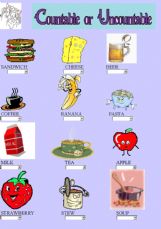
Countable or Uncountable (food)
ss are to choose whether the noun is countable or uncountable.
Level: elementary
Age: 5-100
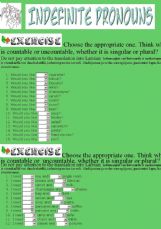
some or a
2 exercises Some or A
Level: elementary
Age: 7-100
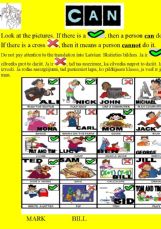
CAN or CANNOT?
a simple exercises to drill Can and Cannot. A matching ws is available on today�s contributions.
Level: elementary
Age: 3-100
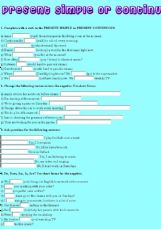
Present Simple or Present Continuous?
It�s an OE for students to revise the use of the PRESENT SIMPLE and the PRESENT CONTINUOUS in context. I hope you find it useful.
Level: elementary
Age: 8-100
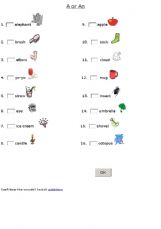
a or an
Students must choose from the articles "a or an" depending on the verb beginning. 16 total questions.
Level: elementary
Age: 3-12
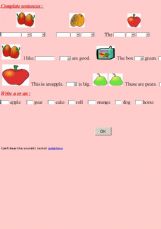
It or They, A or An
M.Kelly 3, lesson 19.
Level: elementary
Age: 7-8
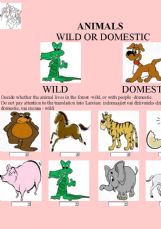
Wild or Domestic
an easy exercise suitable for young learners
Level: elementary
Age: 3-100

Rather than or to
2 simple exercises to introduce the topic
Level: intermediate
Age: 10-100

comparatives or superlatives
multiple choice exercise
Level: intermediate
Age: 10-12
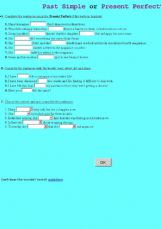
Past Simple or Present Perfect
A few exercises to work on the difference between the Simple Past and the Present Perfect. Mostly affirmative sentences built around the topic of teenage depression.
Level: elementary
Age: 12-14
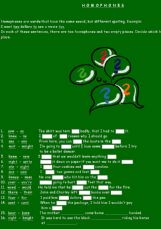
THEIR OR THEY�RE?
English spelling is not easy since most of the time there are no specific rules. The only way to internalize is repetition through as many exercises as possible. This is one of them, very useful.
Level: intermediate
Age: 10-100
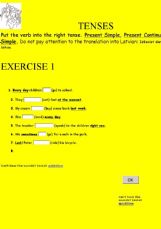
Present Continuous, Present Simple or Past Simple
2 exercises to practice basic grammar.
Level: elementary
Age: 10-100
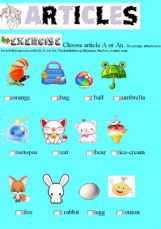
A or An
a short exercise suitable also for the use of very young learners.
Level: elementary
Age: 3-100
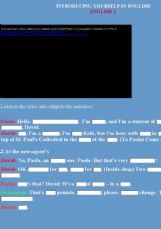
Introducing yourself, ordering food, buying tickets
It�s a listening activity that you need to fill the form and the topics are about: Introducing yourself, ordering food, buying tickets.(BASIC INFORMATION IN ENGLISH)
Level: elementary
Age: 11-100
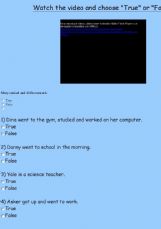
What did you do yesterday? Watch the video and choose "True" or "False"
Students watch a Real English video and decide of the sentences based on it are true or false
Level: elementary
Age: 14-100
|